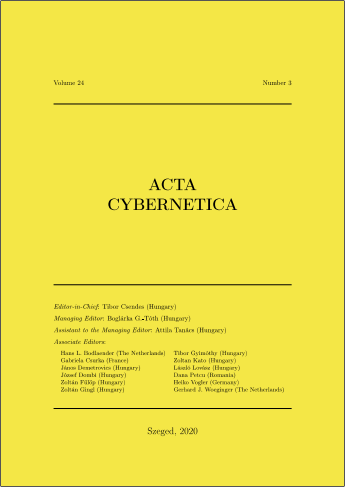Preface
DOI:
https://doi.org/10.14232/actacyb.24.3.2020.1Keywords:
editorialAbstract
The Summer Workshop on Interval Methods (SWIM) is an annual meeting initiated in 2008 by the French MEA working group on Set Computation and Interval Techniques of the French research group on Automatic Control. A special focus of the MEA group is on promoting interval analysis techniques and applications to a broader community of researchers, facilitated by such multidisciplinary workshops. Since 2008, SWIM has become a keystone event for researchers dealing with various aspects of interval and set-based methods.
In 2018, the 11th edition in this workshop series was held at the University of Rostock, Germany, with a focus on research topics in the fields of engineering, computer science, and mathematics. A total of 31 talks were given during this workshop, covering the following areas:
- verified solution of initial value problems for ordinary differential equations, differential-algebraic system models, and partial differential equations,
- scientific computing with guaranteed error bounds,
- design of robust and fault-tolerant control systems,
- modeling and quantification of errors in engineering tasks,
- implementation of software libraries, and
- usage of the aforementioned approaches for system models in control engineering, data analysis, signal and image processing.
After a peer-review process, 15 high-quality articles were selected for publication in this special issue. They are roughly divided into two thematic groups: Uncertainty Modeling, Software, Verified Computing and Optimization as well as Interval Methods in Control and Robotics.
The first part, Uncertainty Modeling, Software, Verified Computing and Optimization, contains methodological aspects concerning reliable modeling of dynamic systems as well as visualization and quantification of uncertainty in the fields of measurement and simulation. Moreover, existence proofs for solutions of partial differential equations and their reliable optimal control synthesis are considered. A paper making use of quantifier elimination for robust linear output feedback control by means of eigenvalue placement concludes this section.
The second part of this special issue, Interval Methods in Control and Robotics, is focused on the design as well as numerical and experimental validation of robust state observation and control procedures along with reliable parameter and state estimation approaches in the fields of control for thermal systems, robotics, localization of drones and global positioning systems.







